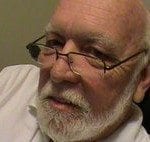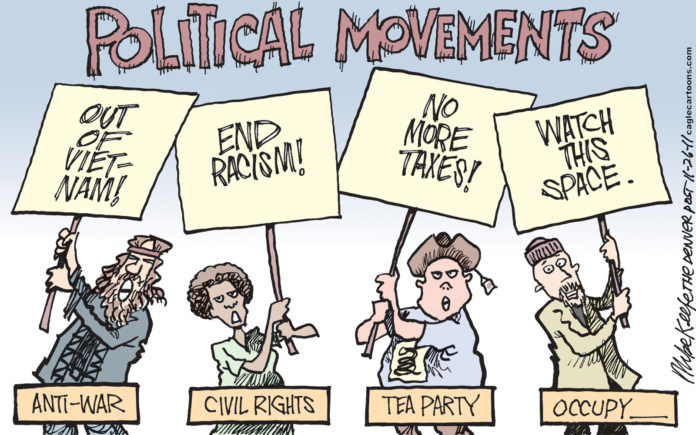BY RICHARD L. FRICKER
 In October 2011 citizens in Tulsa and Oklahoma City joined with thousands of other ordinary Americans in what was called the Occupy movement. The original elements of the movement first went public in New York City by setting up a “People’s” camp in a park adjacent to Wall Street.
In October 2011 citizens in Tulsa and Oklahoma City joined with thousands of other ordinary Americans in what was called the Occupy movement. The original elements of the movement first went public in New York City by setting up a “People’s” camp in a park adjacent to Wall Street.
“Occupy” was a protest against corporations and their control of the economy and undue influence of the elected government. Among other aims of the movement was to draw attention to the disproportionate distribution of wealth in America.
Those in the movement rallied behind the slogan, “we are the 99%” referring to the 1% who control the wealth, economy and government.
Among the organizers of the Tulsa Occupy movement was Stephaine Lewis, a middle age independent business woman. Besides holding public meetings and demonstrations, she and others commenced an open occupation of Centennial Park in downtown Tulsa.
The occupation of the park was disturbed by the Tulsa Police Department which used pepper spray on those who had volunteered to be arrested as part of symbolic show of civil disobedience.
The Observer reported this event as well as other portions of the movement in Oklahoma City and Tulsa. The pepper spray event was reported by the Observer at okobserver.org on Nov. 3, 2011.
As the second anniversary of the Occupy movement rolls into view, Lewis was asked about her memories and reflections of those events:
How did you first learn about the Occupy Movement?
I dreamed of a movement in the U.S. when I saw what was going on in Egypt and other countries, so I was excited when I heard someone was putting together a movement on Wall Street.
What was the tipping point that prompted you to join?
I was looking to start a group in Tulsa when I found out people were starting groups all over the country. It felt really great to be a part of it when the movement was first starting in Tulsa. The tipping point for me was when I realized that so many people were losing their homes and flat out getting lied to by their banks and brokers, like their entire life savings being lost was nothing.
What were your first impressions of the group in which you found yourself?
At first I was blown away that there were so many really smart people coming together with great ideas about their community and country. I was also apprehensive when I met a lot of the people that really didn’t understand how things worked within our government and community.
Had you ever previously participated in such a public demonstration?
Yes I have been an activist my entire adult life.
At what point did you realize you were part of a national movement?
I think it was really hitting home when we put the march together downtown and so many people showed up. Sadly, it was also the same day I realized there was no organization or way to make the movement work because it was a leaderless movement full of people that wanted other people to lead.
What do you feel was the central theme of the movement?
The central theme was to provide a way for people to peacefully assemble 24 hours a day, to discuss the issues of our country and community.
Do you think the public understood what you were doing?
The non-participating public? No. Why? Because we live in an uneducated society led to believe that only elected officials can change anything.
Looking back do you think there was a point when business, i.e. large corporations, banking and local governments began taking you seriously?
Yes, because some issues changed, or so we thought. Yes, again because the corporations upped their funding of police departments and media to control what was happening.
Were you surprised at the extent of and in some cases lack of support for the movement?
Yes, and it is still sickening to me to have experienced that level of disappointment and blank looks from people I knew before the movement started, that I thought should have been involved.
What did you personally learn about the business community, populace in general and local government?
That all is lost or that we have yet to hit rock bottom as a society. I thought things were bad but I guess they were not bad enough. I learned that citizens would rather not stir the pot because they are overwhelmed with basic life and that nearly all politicians in all parties are lying sacks of poop, intentionally or not. I also learned that we are not free, that there is no one there to save our country, at best everything we are hemorrhaging as a country, and there are no bandages for the level of stupidity that we have achieved.
What were your thoughts when you realized there was what appeared to be a coordinated nationwide effort to shut down the movement?
Appeared? There was, without a doubt. I [as a person that worked within the organizations, rules and laws of this country and my community] realized nothing about our country, how things work and our freedom, that I had been taught or idealized was real and that the divisions in our country were even greater than I had thought. I believe my eyes are wide open now that I have had this experience.
With occupations ended and movement participants dispersed, what were the movement’s accomplishments and failures?
The accomplishments for me were only on a personal level as a citizen. The failures, we the people were sold out generations ago and now our society en masse is too uneducated and powerless to do anything about it. The only thing left now is to save yourself and your family or those closest to you. Nearly all that we read or watch on TV that “we” consider news is propaganda, no matter what political viewpoint it is. To be a politician is the definition of corruption and meaning of not getting anything “real” done.
Is the movement still alive?
Absolutely not. Anyone that tells you otherwise is a narcissistic liar or an infiltrator.
Do you think there will be a revival of actual occupation? If not, why not? If yes, what will ignite the movement?
No. The next movement will be civil war or something close to it. I suspect the only thing that will ignite any future movement will be more people losing their low paying jobs, people getting tired of not being paid a living wage, hunger, not being able to afford necessities to live in a house or apartment. Eventually the people that currently don’t realize there is no longer a middle class, but consider themselves middle class and the poor will rise up. Eventually the division and the income inequality/class warfare in our country will become so great that the current day slaves will rise up but that would require some sort of reality. Churchill said Americans will eventually do the right thing after they have exhausted all other avenues.
Will you be there? Why? Why not?
Would I be there if it happened? Probably not because the mental health situation in the U.S. is intentionally out of hand and large groups of people are not my thing anymore.
America is where I currently live, it is not necessary for me to remain here for much longer. According to the latest data there are at least 16 better and freer countries to live a better life.
America is no longer the best place in the world [or even high ranking enough] in my eyes and not even worth fighting for in my opinion. The problem is, of course, immigration limits to the better places in the world … go figure.
– Richard L. Fricker lives in Tulsa, OK and is a regular contributor to The Oklahoma Observer. His latest book, The Last Day of the War, is available at https://www.createspace.com/3804081 or at www.richardfricker.com.








As a participant in the Occupy movement i take exception to you choosing Ms. Lewis as a spokesperson. She parted ways with Occupy Tulsa early on when it became apparent she was attempting to use the group to further her own ends.
If you want someone to interview, try asking any of the people arrested in centennial park. Even the least eloquent among them still have a better grasp of concepts espoused by Occupy
I covered Occupy from organization through several events. I have no idea who you are and don’t recall your name having ever been mentioned during any interviews with me or other reporters.
In short, although I seldom respond to comments, I have know idea who your are, what or who you think you are, and find your comment without merit.
Scott,
The reason he doesn’t remember you is because he is close friends with Stephanie and was only around to “cover” the group as long as Stephanie was there…in other words, he was there in the first few weeks and then never showed up again.
After she failed in her attempts to take it over and then pitched her big fit and started her name calling and other shenanigans, this Fricker guy was notified that she no longer was apart of the group, but he responded with his own name calling and told me I had a “personal problem” with her.
Its not hard to find numerous other people who have denounced her and her behavior in regards to Occupy. A simple google search of her name and Occupy will bring up the stories of her. Even KRMG covered the split.
Fricker, you’re response is a perfect example of the logical fallacies of argumentum ad ignorantiam as well as straight up Ad hominem.
Try utilizing some actual ‘journailsm’ once in a while instead of relying on your friends who cherry-pick facts to inform your ‘articles.’